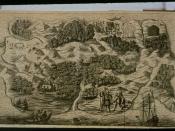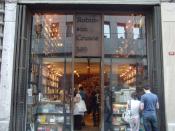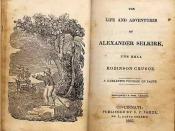Crusoe represents the average individual struggling against society and the accepted views of the time period during which he lived. The beginning of the book deals with the struggle with, not society, but his parents' expectations. Crusoe must choose between security or adventure. His father greatly encourages him to study law, but Crusoe refuses. Crusoe's parents become symbolic not only of all parents, but of society. Crusoe tries to break out of the standards of the middle-class, and accomplish new goals. In this book, Defoe uses the story of a shipwrecked soldier to criticize society. At first, Crusoe is indecisive whether to run away from home or stay and live a boring life. He runs away, then confesses to his mother his plans. A few months later, he then secretly steals away on a ship going to London. Through this process, Robinson begins to think for himself, rather than relying on the decisions of others.
The boat is taken over by Turkish pirates, and he escapes with Xury. Two years later, Robinson trades his servant, Xury, for a trip to Brazil, where he becomes a planter. Crusoe ownership of the plantation as well as a Negro slave show the first example of Robinson creating his own society. Though successful, Crusoe desires adventure and joins a group of traders to Guinea. On the way, a great storm strikes and causes Robinson to jump overboard. He swims to a nearby landmass, and is the only survivor. Crusoe collects supplies from the sinking ship and builds his own civilization. In the island setting, Crusoe's life depicts what is necessary for the creation of a utopian society. Crusoe takes an island of paradise and turns it into utopia. He creates this in the presence of everything except people. When alone on the island, he...


